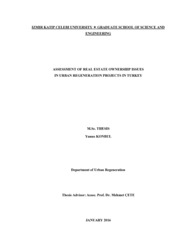Assessment of real estate ownershıp ıssues In urban regeneratıon projects ın turkey
-
Eser Sahibi
Konbul, Yunus
- Tez Danışmanı Mehmet ÇETE
-
Tür
Yüksek Lisans
- Yayın Tarihi 2016
-
Yayıncı
İzmir Katip Çelebi Üniversitesi Fen Bilimleri Enstitüsü
- Tek Biçim Adres Http://hdl.handle.net/11469/588
-
Konu Başlıkları
Sosyal Bilimler_Kentsel Dönüşüm_İzmir
Earthquakes - Social aspects - Turkey - Izmir
ASSESSMENT OF REAL ESTATE OWNERSHIP ISSUES IN URBAN REGENERATION PROJECTS IN TURKEY SUMMARY Illegal settlements, urban sprawl and old urban areas can be transformed into livable spaces with urban regeneration projects. Especially because of the earthquake risk and its low quality building stock, Turkey is one of the countries where implementation of those projects is vital. However, real estate ownership problems experienced at the beginning of the urban regeneration projects hinder implementations of the projects. Therefore, identifying and eliminating those problems can help carry out the projects successfully. In this study, the interviews with a number of stakeholders in five different regeneration project areas in Izmir were carried out in order to understand the problems and their expectations. Then, interviews were carried out with experts and personnel of some of the authorities carrying out regeneration projects in Turkey, namely Izmir Metropolitan Municipality in Izmir; Altındağ Municipality, Mamak Municipality, Housing Development Administration and General Directorate of Infrastructure and Urban Regeneration Services in Ankara; Esenler Municipality, Gaziosmanpaşa Municipality and Istanbul Metropolitan Municipality in Istanbul. Real estate problems in the regeneration projects were discussed and identified in those interviews. By means of those interviews and literature review, a typology of urban transformation initiatives was described, potential stakeholders were listed, and some mathematical models for determining property rights of stakeholders were developed. It was stated that the cause of the paradox of “increasing building density” or “displacement” is the financing model. Negotiation issues among stakeholders and technical problems on determining land-share proportions in condominiums were shown. The importance of documentation and public relations especially when carrying out expropriation, property transfer and determining regeneration area boundaries was explained. Inefficiency of the Turkish urban regeneration legislation and the issues originated from this inefficiency was discussed. For example, it was stated that lack of definitions in the legislation about who the right holders are and what are the rights that should be given them leads to problems in different projects and makes the projects subject to court cancellations. Importance of realization of urban regeneration projects by local authorities because of their better ties with stakeholders and knowledge about local issues and support of central authorities to local authorities in terms of expertise and finance were discussed. This study intends to fill the gap in the Turkish and English literature about real estate ownership issues experienced in the Turkish urban regeneration projects and tries to develop some solutions for those issues.
-
Koleksiyonlar
ENSTİTÜLER
FEN BİLİMLERİ ENSTİTÜSÜ

 Tam Metin
Tam Metin

